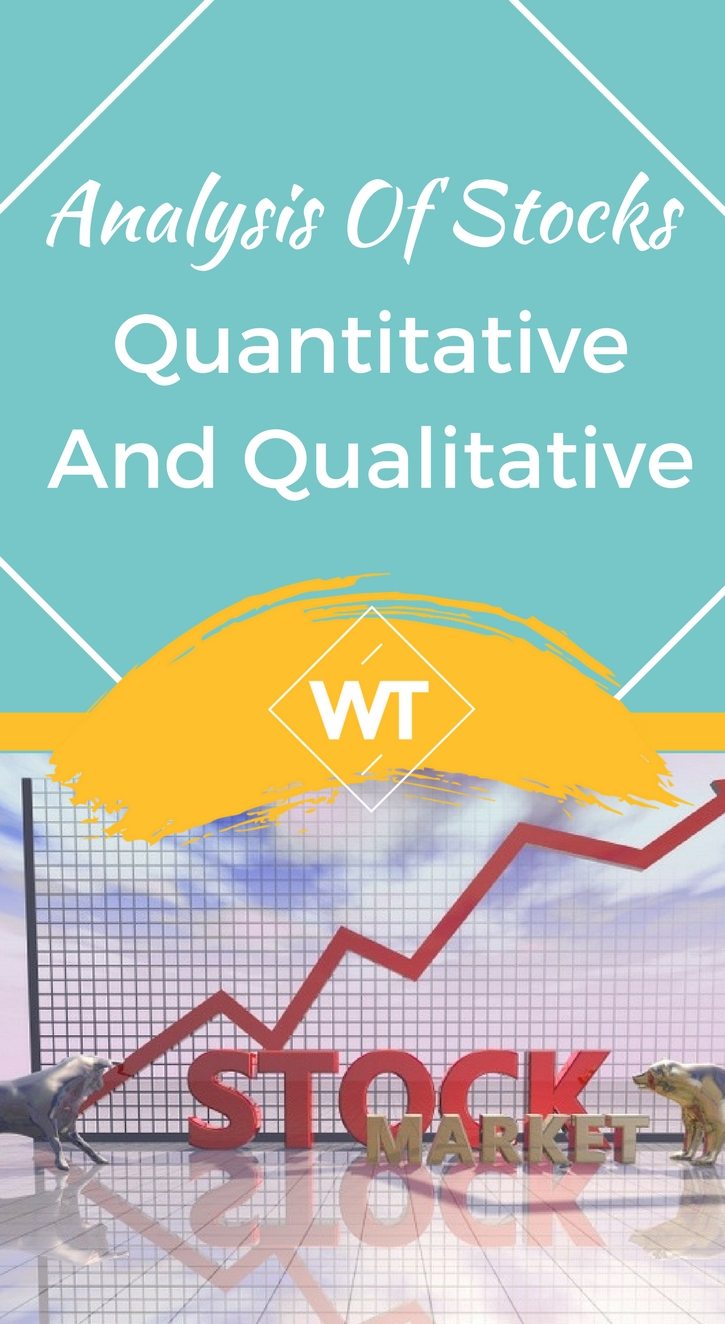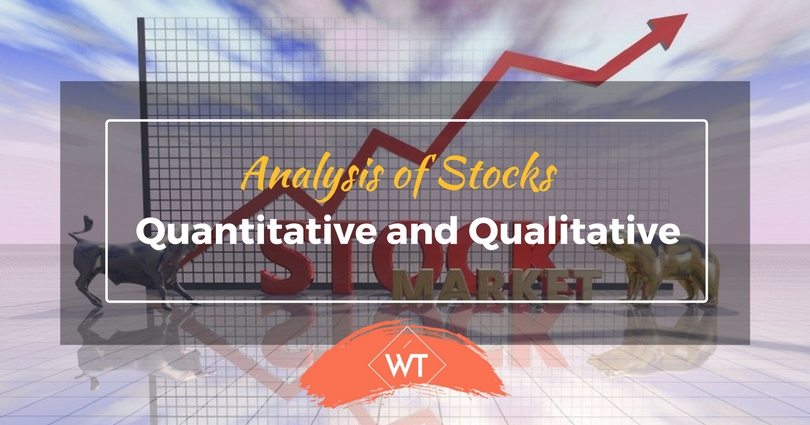Analysis of Stocks – Quantitative and Qualitative


Most market gurus and academicians in Financial Markets agree that fundamental analysis of stocks would provide a good base to take sound investment decisions for long-term investors. Fundamental analysis of stocks involves understanding three broad spheres – Economy, Industry and Company specific factors.
In this article we are going to see factors which affect company. But here you have two broad areas:
1. ‘Quantitative’ Analysis of stocks
2. ‘Qualitative’ Analysis of stocks.
Quantitative Analysis of Stocks
Mostly deals with financial performance or other business metrics. For this we require certain data sources or inputs about the company. The most common data sources are:-
- Income Statement
- Balance Sheet &
- Cash Flow Statement
There are other additional documents and information which are also equally important to supplement this data. For more details on this you can refer to my earlier articles “Understanding Key Investment Ratios for Stock Picking” or “Personal Finance Management”.
Qualitative Analysis of Stocks
This deals with the analysis of qualitative characteristics of the company, which are highly subjective in nature. For instance the quality of management, corporate governance practices, ethics, reputation in the market, brand value, consistency of business strategies, etc.
The most common source is the “Management Discussion and Analysis” section o f Annual Report. The section could also be captioned as Business Review, Management Review, etc, but that is only a semantic difference.
Why Qualitative Analysis is important?
Let us take real life situations like selecting a friend or a life partner. In these cases we look at various factors before we get in to a serious relationship. For instance when you are choosing a life partner you look at factors such as good looks, education, family background, character, personal habits, etc.
Many of these factors are not measurable because they are highly subjective in nature. Similarly when you are examining a company for investment you need to know the company’s management, their experience, style of management and their philosophy as a whole.
This will tell you more about the company, and can also help you get more insightful information when you compare these with quantitative factors such as return on investment, dividend payouts, etc.
What to look for?
According to Investopedia.com (one of the leading investment education portals), investors can look at five Ws: who, where, what, when and why? If these five questions are answered one gets an idea of the overall strength of management, its capabilities and what to expect.
The factors to look out for are given below in detail, but in a different format.
Know the Management Team
Try to research on who constitutes the Management team and board of directors. In most annual reports and company websites you will get information who the CEO, CIO, Chairman are.
Some of these names would be the most admired people and stars in the industry such as Jack Welch of GE or Deepak Parekh of HDFC, while for others you may need to do further research to know the person and his or her background, which will be discussed next.
Background & Capabilities
- You need to know the background of the CEO and the management team in general. It may not be practically feasible to know every member, but try to know the key personnel and their education, past experience, etc.
- Executives who come with strong experience in similar industry or from reputed organizations will be a good asset for the company. One should also ask questions such as “Whether he or she has the necessary capabilities to run the business?”
- Most institutional investors or funds try to thoroughly assess these aspects, but it may be practically difficult for an individual investor to evaluate or assess the management quality.
However, a few pointers can give you some information or hints about this. For example if there is a new management team coming from an unrelated industry this must be closely examined. Resignation of a Director or Member should also prompt you to think.
If you observe conference calls from brokerages and institutions on TV you will know what type of questions are asked when there are management changes.
Management Philosophy (Style of Management, Transparency, etc)
This is a highly subjective area, but if you read the Annual Reports and closely observe the company’s past actions and also read media reports, you will get a sense of what the management is up to. Management Philosophy includes style of management, policies, procedures, focus on strategies, execution of strategies, etc.
Some managers are highly rigid and may not be open to change, while some may be open and flexible. Transparency and accountability are important attributes to look for.
The management should have all systems and processes in place to make sure that all operations are done in accordance with laws or the land and be accountable for their performance.
In tough situations even good management team might make bad judgments and face challenges, but their strength and reputation can be judged in the way they accept the mistakes, find ways to solve problems and move ahead with positive action plans.
For example there were issues in LIC Housing Finance when one of the senior executives was involved in a bribe scam. The company lost its reputation and its stock tanked for several weeks.
However, the management has been dealing with the problem and also responding to questions posed by media and public and assuring them that necessary systems and checks are being put in place to avoid such incidents in future.A few months later the case is still being heard in courts, but investor confidence is back given the fact that the company’s operations have not been affected significantly.
Tenure and Performance within the company
This is also linked to background and experience, because we are looking at the tenure of the person in the company and his or her contribution during that period. People like K.V.Kamath (now Chairman of Infosys) have spent decades as Chairman of ICICI Bank and has been one of the most popular faced in the industry in general.
He has been credited with transforming ICICI Bank in to India’s largest private sector bank with a large national network as well as international presence.
Sometimes senior professionals within the company could be elevated to management positions, so this requires an understanding of the individual’s profile and contribution to the company.
We have seen a few things about the company and its management but one should also look at other attributes in the company to know its true value in the market. I am not sure of how to term these characteristics, but let us call them ‘Investor friendliness’ qualities.
Investor Friendly Qualities
1. Robust business model
The company should have a solid and well defined business model that clearly shows how the company makes revenues and profits out of its businesses.
For example banks primarily make money from interest income, which is the net difference (or spread) between ‘interest earned on loans/advances’ and ‘interest cost on deposits’. We will discuss more on this in the article “Know the business you are investing in to”
2. Brand Value & Appeal
Many companies have solid brands. For instance Hindustan Unilever has strong brands such as Ponds, Rin, Vim, etc in its product portfolio.
Similarly any patents, trademarks, licenses also have tremendous value embedded in it that generates revenues for several years or decades. How well these brands perform will also determine success of the product line and influence the company’s performance too.
3. Market Share or Competitive Advantages
You don’t want to invest your hard earned money in a mediocre player, but want to choose companies which have a dominant market share and/or competitive advantage.
If the company is not a market leader, it should atleast have a competitive advantage or edge over other players in terms of product differentiation, low cost sourcing, better distribution, higher price realization, superior quality, etc. If it is a large cap company or stock its quite safe, but if it’s a mid or small cap stock you have to do a lot of homework before committing your money to it.
4. Regular Dividend Payouts
Companies which are regular in dividends and have decent dividend payouts are good for investors. However, this does not mean you will get a good dividend yield. This only shows that the company follows a philosophy of sharing its profits with investors on a regular basis.
If the company makes good profits but pays lesser dividend or does not declare dividend is it bad? Not necessarily provided the company uses its funds judiciously for future growth in businesses or projects that will deliver more returns. But this can also be a dangerous if the company uses surplus funds to get in to unrelated businesses or non-core businesses.
5. Institutional Participation
If you observe the shareholding pattern of any company you will get to know if large institutions have a stake. If a major chunk of stock is held by FII’s, domestic institutions, mutual funds, etc, then it means they do hold the stock for good reasons.
However, this is only one of the factors to look for. One has to stay away from companies where there is limited institutional participation.
Although we discussed a lot about qualities, characteristics, etc these are highly subjective. Its as complicated as finding a life partner or a dream date. But fortunately in case of stocks you have financial numbers to guide you to make easier comparisons making life much easier.
Next time you try to invest in a stock at least try to do some research on the company, its management, its products, market share, etc so that your decision is not way off the mark.
Disclaimer
All the facts and views expressed are based on information available in published media sources. Some examples are shown for the purpose of knowledge, and does not necessarily reflect the view of the author or the website.
The stock market dynamics keep changing, so analysis of stocks is very important before you pour in your hard earned money. It’s better to be safe than sorry!








Leave a Reply